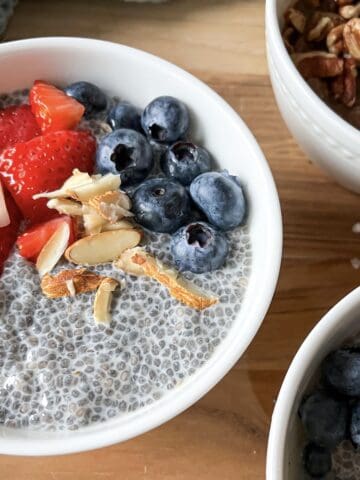If you've found yourself questioning what functional nutrition is, you've come to the right place. In this article, I unpack the basics of functional nutrition and functional foods, and how to get started with functional nutrition.

Jump to:
What is Functional Nutrition?
Functional nutrition is an individualized and holistic approach to food based on a person's unique needs. It revolves around the idea that there is no singular best diet that works for everyone because nutrition needs depend on many factors. Some of these factors include lifestyle, activity levels, genetics, environment, and medical history including the presence of chronic conditions or chronic disease.
Simply said, your nutrition needs are as unique as you are. And making food choices based on your health needs as a whole person is important if your goal is optimal health through the use of food and dietary changes.
Some of the basics of integrative nutrition or functional nutrition include:
- More Whole Foods: using whole foods when possible to meet nutritional needs.
- Less Ultra-Processed Foods: avoidance of ultra-processed foods that don't provide much nutritional value when possible.
- Nutritional Supplements: supplementation is used as needed to correct nutrient deficiencies.
- Gut Healthy Foods: an emphasis on maintaining a healthy gut microbiome which is where a majority of your immune system lives.
- Hormone Health: balancing hormones through foods as an important part of being healthy and feeling energized.
- Addressing Food Intolerances: avoiding certain foods if you have food allergies or food sensitivities.
- Lifestyle Interventions: in addition to proper nutrition, functional healthcare practitioners consider lifestyle factors including sleep quality, stress levels, hormone health, and physical activity.
Functional medicine, including individualized nutrition plans, will likely continue to grow in popularity as more research emerges showing the correlation between what we eat and how we feel.

Functional Foods
The idea of “food as medicine” isn't new. It was first introduced by the father of medicine, Hippocrates, about 2500 years ago when he said “Let food be thy medicine and medicine thy food.”
A good place to start with functional nutrition is to become familiar with functional foods and incorporate more of them into your diet when you're able to.

Functional Foods Definition
People understand that the foods and beverages they consume have a direct impact on their overall health. According to the Natural Marketing Institute's 2022 Health & Wellness Trends in America report, 64% of the population eats functional foods and 60% would prefer to get everything they need from their food rather than taking supplements.
So what exactly are functional foods? The term functional foods was coined in the 1980s by the Japanese government. Functional foods are defined by the Academy of Nutrition and Dietetics as whole foods or fortified, enriched, or enhanced foods that have a potentially beneficial effect on health when consumed as part of a varied diet regularly at effective levels. It is important to note that currently no legal definition of functional foods exists and the claim is not regulated by the FDA.
Functional nutrition includes foods that decrease the risk chronic illnesses as well as foods that support energy levels, mental and brain health, gut health, and hormone health.
There are 2 classifications of functional foods: conventional and modified.

Conventional Functional Foods
Conventional functional foods are foods that have inherent nutritional value in their natural form. This includes foods found in nature. Fruits and vegetables, nuts, whole grains, seeds, legumes, and healthy fats all fall into this category.
Below are some examples of conventional functional foods:
- Oatmeal contains beta-glucan which can help to decrease cholesterol levels.
- Blueberries contain anthocyanins, which are potent antioxidants that have anti-inflammatory and anti-diabetic benefits.
- Tomatoes contain lycopene which have been shown to lead to a reduced risk in heart disease and certain cancers.
- Turmeric contains curcumin which helps to decrease inflammation in the body, especially when paired with black pepper.

Modified Functional Foods
Modified functional foods are foods that have been fortified or processed in some way to add functional ingredients or enhance healthfulness of the food.
Below are some examples of modified functional foods:
- Rind Snacks makes dried fruit with the peel on. In doing so, they preserve some of the additional fiber and antioxidants found in the peel of fruit. Fiber improves gut health and can help lower cholesterol.
- Rhythm Superfoods makes a line of snack products made from real fruits and vegetables. These are salty and crunchy snacks full of antioxidants and fiber. Some of the products are mushroom crisps, kale chips, and cauliflower bites.
- Owyn Protein Shakes contain plant based protein, added superfood greens, and Omega-3s. Omega-3s have many health benefits including playing an important role in cardiovascular and brain health.

How to Get Started With Functional Nutrition
If you are interested in getting started on a functional nutrition eating plan, seeing an integrative and functional dietitian nutritionist in your area is a great start. A functional dietitian can help you solve the mystery of what foods work best for fueling your body rather than following standard nutrition recommendations.
Functional dietitians have a bachelor's degree in nutrition science or a related field, and often also achieve a master's degree. Many go through a functional nutrition training program to learn functional medicine principles and lifestyle medicine. They work with other health professionals in private practice or have live sessions online.

Are Functional Nutrition and Functional Medicine the Same Thing?
Functional nutrition and functional medicine have many of the same principles but aren't the same thing. Similar to a functional nutritionist, a functional medicine doctor focuses on a whole-systems approach to treat the root causes of your symptoms rather than masking symptoms with medication. Nutrition is often part of this holistic approach, and a functional dietitian is typically an important player in the treatment plan.

In Conclusion
Functional nutrition is a holistic approach to nutrition that considers a person's environment, lifestyle, activity levels, stress, and other factors to determine and individual's unique nutritional needs. Functional nutrition focuses on treating the root causes of illness with functional foods and lifestyle changes rather managing symptoms with medication. It acknowledges that there isn't a one-size-fits-all approach to nutrition, and a functional dietitian can help you form a nutrition plan customized to your specific needs.
I hope you enjoyed this article! I would love to hear from you if so. Please leave me a comment below or find me on Instagram....I LOVE knowing there’s people out there reading my articles. 🙂 IG: @mallorythedietitian
References: Academy of Nutrition and Dietetics, BMJ Journal, Natural Marketing Institute 2022 Health and Wellness Trends in America report, Colorado State University Extension, CMAJ, Healthline, The Institute for Functional Medicine, Institute for Integrative Nutrition
Looking for More Nutrition Education?
Here are some of my educational posts you may enjoy:
Check Out These Nourishing Recipes
Go to all Recipes --->

























Comments
No Comments